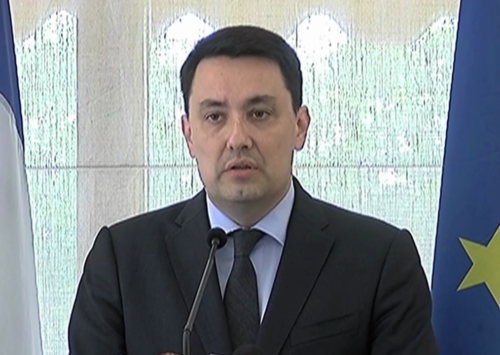French Presidential Elections
As the French prepare to cast their votes on Sunday, a bit of fear and a great deal of uncertainty could play a big role in their choice of the candidate, from a field of 11 aspirants. This could benefit the far right leader Marine Le Pen.
Thursday’s shooting death of a police officer by a suspected terrorist of the Islamic State, on the Champs Elysees avenue, perhaps the world’s most famous road, brought once again the issue of terror and insecurity to the fore, even though no candidate overtly tried to encash political capital from the incident.
Indeed, the issues had never completely disappeared from the minds of the French – voters as well as the elected representatives and the state machinery. Over the past two years, France has been hit by a series of terror incidents, beginning with the attack on French satirical newspaper, Charlie Hebdo in January 2015 that claimed a total of 17 lives in several incidents in and around Paris, lasting three days.
Since then, a total of 21 terror incidents, almost all linked to or claimed by the IS, have hit France, including the bloody November 2015 attack on Bataclan, a theatre, which claimed 137 lives, including seven alleged terrorists and the Bastille Day attack in Nice on July 14, 2016 when a truck mowed down pedestrians, leading to 87 deaths.
The unprecedented situation has led to a number of voters seeking safety in the hardline declarations by the French far right party, Front Nationale, whose savvy leader, Marine Le Pen, has mounted her campaign on four major issues that continue to haunt France and several other European nations.
Besides terror, the issue of the flood of migrants that has swamped EU since 2015 is right on top of her agenda and of course the voters’ minds and not just in France. Le Pen squarely blames uncontrolled migration and the resultant challenges on the faulty policies and the decision-making process in the EU.
As part of her radical measures to ‘cure France from all maladies’, Le Pen says she will make France exit the 12-member Eurozone group and restore the French Franc, that had made way for the common currency in 1999. Le Pen’s statement that the EU has become too centralised and the country has lost sovereignty does find a lot of resonance with voters in the French industrial heartlands and indeed zones with relatively higher migrant population. She was the only prominent French politician to welcome Brexit and proposed a referendum on Frexit, if elected. Nearly 37 pc of the French believe that the EU has become too powerful and more a hurdle than a strength for France as against 31 pc who believe membership of the EU is an advantage.
Though many French find most of Le Pen’s campaign promises terrifying, her party has managed to consolidate a firm base of at least 22-23 percent of voters across the nation and she has been building on this foundation to emerge at the head of the presidential candidates’ field, often swapping places with Emmanuel Macron, former minister in President Francois Hollande’s candidate until his resignation last August to announce his candidature. One of the last opinion polls, published on Friday, shows Macron at 23 percent, with Le Pen at his heels with 22 percent of intention of votes.
Le Pen’s strength also comes partially due to the weakness of the candidates of the two main parties – the ruling Socialists and the main opposition party, the centre-right Les Republicains. Francois Fillon, a former prime minister under Hollande’s predecessor, Nicolas Sarkozy, has been caught in a corruption scandal for having paid nearly a million euros in fictive work done by his family members as his assistants in the Parliament. Fillon was rated the favourite till the scandal broke nearly three months ago.
However, as Fillon fought for his political survival, Macron has emerged as the top contender for the job, leading Fillon by nearly 6 points in opinion polls, meaning that Fillon could be knocked out in the first round polls on Sunday. This is the first time since the end of the World War II that neither of the two major political parties would be represented in the second round of a presidential election.
Though polls suggest that Le Pen could lose in the second round, whether pitted against Macron or Fillon, her campaign and the mood on the ground in France has made Fillon and others to take more extreme positions on issues of migration and security than would be the norm. Another change in the political landscape which is almost sure to last beyond these elections is the emergence of FN as a leading force in many major cities and industrial centres in northern and southern France, leading to a much higher representation for the party in the French Parliament when the elections take place in June.















